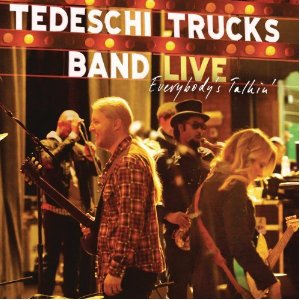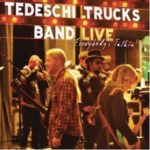
Sony Masterworks
In the long history of the live album, ranging from contract filler to collateral concert take-away to certified classic, some have succeeded far better than others in offering a representation of what it is to be there. Results can vary from a record that codifies the repertoire to the point that the artist must repeat it verbatim in order to satisfy its audience the next time around to ones that fail to capture it well enough. Reputations for being a dud live act will stick just as strongly. With Everybody’s Talkin’, Tedeschi Trucks Band has exacted the ideally balanced trifecta, delivering a live album that unleashes performances unique to the moment, yet reminiscent of a glorified past, and remarkably possible each and every night.
Recorded over four theater dates in late October 2011, Everybody’s Talkin’, opens the proceedings without introduction, launching the title track, a Bill Withers arrangement of the “Midnight Cowboy” cut popularized by Harry Nilsson, on a Derek Truck’s guitar riff that eventually has the audience clapping along under a Susan Tedeschi vocal break. It’s a party-starter that gives way to an introspective “Swamp Raga” intro (with Allman Brothers Band “Little Martha” reference) melding into a stunning “Midnight in Harlem”, the first of four tracks from the Grammy-winning Revelator. Everybody’s Talkin’ is produced by Trucks, who, as a member of the Allman Brothers Band, is no stranger to the pressures of achieving “definitive live album” status. After culling hours of shows, it is apparent he learned well from the Allman’s At Fillmore East, as the guitarist presents each and every talent possessed by the band’s members. While his slide guitar dazzles from the get-go, the slightly divergent path Tedeschi opts from the chorus phrasing of the “Harlem” studio version is what fashions this take transcendent.
Next, on “Learn How to Love,” the bursting saxophone of Kebbi Williams shines until Tedeschi and Trucks draw swords, alternately recalling Hendrix in full Band of Gypsys mode. The wicked interplay is a rattling reminder of Tedsechi’s six-string talents that often get overshadowed by her vocal strength.
“Bound for Glory” follows and makes its case for best expansion on the original. Slated as a Revelator radio-ready single, here it breathes with each developing section, asserted by the dual keyboard attack of Kofi Burbridge and handed off nicely to an inspired slide run from Trucks. Elmore James’ “Rollin’ and Tumblin’” nods to the post-war blues predecessors and juxtaposed with “Nobody’s Free,” a new Tedeschi/Trucks composition that ping-pongs between gentle soul and ripping rocker, demonstrates the evolution of the genre. It also exhibits the brotherly brilliance of Burbridge and sibling Oteil (bass). He and Kofi, on flute, race riffs in a dynamic display of dexterity, all bolstered by Trucks’ fusion-mad comping.
Disc One closer “Darling Be Home Soon,” a Joe Cocker favorite from the deluxe Mad Dogs and Englishmen, is a smoother-sheets version than that of the British soulman courtesy of the Saunders Sermons/Mike Mattison/Mark Rivers trio of background vocals, as well as the dancing trumpet of Maurice Brown. That is until Trucks once again extends the sonic boundaries with a soaring slide outro.
The slow boil of Bobby Blue Bland’s “That Did It” opens Side Two with Tedsechi’s stabbing licks stoking the flames long enough until the Stevie Wonder hip-shaking “Uptight” threatens to burn the place down. Designed originally as a ‘60s dance number, it’s turned loose, and, at nearly 16 minutes, a player’s showcase that will have the listener scrambling to the liner notes. Brown is up first, blowing counterpoint to the Burbridge bassline before ceding to the drumming duo of Tyler Greenwell and J.J. Johnson and the ethereal note-singing/playing that could only be Oteil. There’s room for a good-old fashioned drum duel before slipping nicely unfinished into “Love Has Something Else to Say” (with a “Kissing My Love” interlude). Grooving and grinding, the spotlight turns to the lowdown leads of singers Mattison and Rivers before Sermon’s trombone slides into frame. “Wade in the Water,” the Staples Singers gospel, eases the evening to a close, with a gentle decrescendo that plays almost like exit music for a departing audience.
At its best, Everybody’s Talkin’ exemplifies the band members’ ability to be perfectly complementary role players one second and stars the next. More than anything, this is a collective unit that supports one another generously, and like a sizzling jazz combo, accentuates the positives of the soloist that, in turn, elevate the group. Deftly mixed by Jim Scott ( Revelator ), the music flows seamlessly from one song to the next, all from the perspective of the best seat in the house. Everybody’s Talkin’ is set to join the pantheon of concert album majesty.



No Comments comments associated with this post